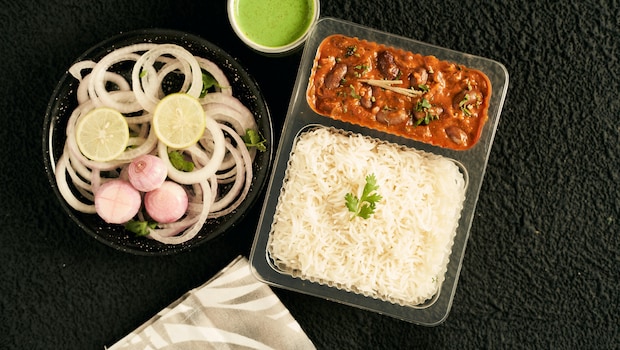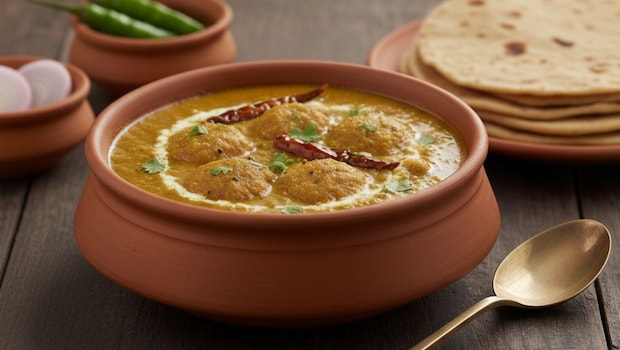Indian cuisine, rich in flavours and shaped by region after region, continues to evolve in every household. Out of all the meals that have made their way into the collective memory of Indian kitchens, Rajma Chawal and Kadhi Chawal remain two of the most relied upon. They offer satisfaction, warmth, and the reassurance of home-style food that feels familiar on busy days and quiet afternoons alike. Rajma Chawal brings depth and spice with its hearty kidney bean curry, while Kadhi Chawal brings tangy comfort through its yogurt base. Their ingredients, cooking styles, and flavour profiles might sit on opposite ends of the spectrum, yet both reflect the variety that Indian food celebrates. Whether someone prefers the earthy punch of Rajma or the gentle freshness of Kadhi, each plate carries its own appeal. Here is how they stand side by side in Indian homes.
Also Read: Dal Vs Rajma: Which Indian Staple Packs A Bigger Protein Punch?

What Makes Rajma Chawal A North Indian Favourite
Rajma Chawal has that unmistakable North Indian charm, the kind that fills a kitchen long before it reaches the plate. The beans slow-cook in a rich onion tomato base until they turn soft, creamy, and full of warmth. It is the kind of meal that feels fitting on lazy Sundays, rushed weekdays, and the days in between.
Why Rajma Chawal wins hearts:
- Built on a thick onion tomato gravy that carries depth
- Slow-cooked beans that turn naturally creamy
- Strong, familiar spices without burning heat
- Perfect fit for colder days or hungrier appetites
- A classic Punjabi comfort meal that travelled across India
Why Kadhi Chawal Is A Light, Tangy Option
Kadhi Chawal comes with a quieter energy, the kind that makes you reach for it when you want comfort without heaviness. The yogurt and gram flour base gives it a gentle tang, and the tempering adds just enough aroma to keep it interesting. It is soothing, simple, and perfect for days when you want something easy on the stomach.

What sets Kadhi Chawal apart:
- Tangy yogurt base that feels refreshing and mild
- Silky texture that pairs well with soft rice
- Adaptable: plain for some homes, pakora-filled for others
- Naturally light and ideal for warm-weather meals
- A dependable option when you want a calming plate
Rajma Chawal vs Kadhi Chawal: Key Differences In Taste And Cooking
To understand why these dishes are often compared, it helps to see their contrasts clearly.
| Feature | Rajma Chawal | Kadhi Chawal |
|---|---|---|
| Flavour | Deep, hearty, bold | Tangy, light, refreshing |
| Base | Onion tomato gravy with spices | Yogurt and gram flour |
| Texture | Creamy beans in thick curry | Silky, smooth, gentle |
| Cooking Time | Longer due to soaking and simmering | Quicker with fewer steps |
| Best For | Heavy meals, winter, hunger | Light meals, summer, digestion |
| Nutrition Focus | Protein, fibre | Probiotics, easy digestion |
| Comfort Level | Rich and satisfying | Soothing and calming |
Both rely on rice to complete the meal, yet they offer entirely different experiences based on mood, weather, and appetite.
Which Is Better: Rajma Chawal Or Kadhi Chawal
Choosing between Rajma Chawal and Kadhi Chawal is less about ranking them and more about matching them to the day you are having. One steps in when you want something rich and filling, the other when you want something calm and light. They do not compete; they complement.
When Rajma Chawal makes more sense:
- You want a heavier, satisfying meal
- The weather feels cooler or you feel hungrier
- You prefer a protein-rich plate
- You have the time for longer cooking
- When Kadhi Chawal is the smarter choice:
- You want something soothing and easy to digest
- The weather is warm or you want a mild meal
- You need probiotics and a calmer flavour
- You want a faster, simpler cooking process
Both remain favourites because they fit different moods, different seasons, and different appetites without trying to take the same spot on the table.
Is Rajma Chawal Healthy?
Rajma carries a strong nutritional profile that supports daily health.
Also Read: Kadhi Not Sour Enough? These 5 Tips Will Make It Extra Sour And Delicious
Nutritional benefits of Rajma Chawal:
- High in plant-based protein
- Contains fibre for digestive support
- Offers potassium and magnesium
- Helps with steady energy release
- Provides antioxidants linked to reduced inflammation
Rajma can feel heavy if eaten frequently by those with slow digestion, so moderation becomes important. Click here for the complete recipe of rajma chawal.
Is Kadhi Chawal Healthy?
Kadhi brings its own benefits through its yogurt base and gentle preparation.
Nutritional benefits of Kadhi Chawal:
- Provides probiotics that support gut health
- Naturally gluten free because of gram flour
- Lower in calories and fat compared to many gravies
- Easy to digest, making it suitable for daily eating
- Offers a cooling effect during warm seasons
Many households enjoy kadhi with pakoras, but others skip frying and add vegetables like spinach or peas to increase flavour. Click here for the complete recipe of kadhi.
Regional Variations Across India
India offers many versions of both dishes, shaped by climate, produce, and local tastes.
Regional variations worth noting:
- Himachali Rajma uses locally grown beans with deeper colour
- Kashmiri Rajma has a smoother gravy profile
- Gujarati Kadhi is milder with slight sweetness
- Punjabi Kadhi is thicker and more intense
These subtle differences keep both dishes rooted in local culture while fitting effortlessly into kitchens across states.







